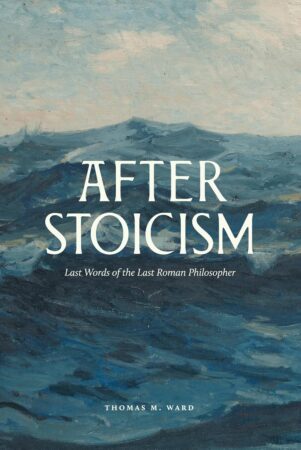After Stoicism: Last Words of the Last Roman Philosopher
Thomas M. Ward (Word on Fire, $36, 201 pages)
 In recent years, there has been a growing interest in Stoicism, from academic publications to YouTube videos, about Zeno, Marcus Aureliu and Seneca, among others. There is much to recommend in Stoicism, an ancient Greek philosophy that taught that virtue is the highest good and is based on knowledge and harmony with divine Reason or fate. It is compatible to a Christian worldview, and Thomas M. Ward in After Stoicism, effectively demonstrates that compatibility through the Roman philosopher Boethius’s engagement with Stoicism in his book The Consolation of Philosophy which affirmed the good parts of Stoicism and corrected its shortcomings and errors. To provide just one example, Boethius insists that mankind has moral agency and that the Stoic distinction between freedom of action (denied by the Stoics) and freedom of reaction (to what Fate throws at us) is meaningless. Ward says that Stoics themselves might be ambivalent about the idea, noting that Marcus Auerlius “can’t fully embrace the thought that destiny determines everything.” Boethius rejected Stoicism’s insistence that the highest happiness man could enjoy is tranquility, which is often interpreted as indifference. Boethius, on the other hand, said that tranquility was not enough. Boethius’s “consolation” was taking noble elements of Stoicism and mixing it with religious conviction and its demands, the combination of which helped him through the suffering he experienced while imprisoned awaiting execution. Ward concludes that “philosophy, grasped through reason, can us to the hope that there is a God who is wise and good and who therefore will make all good” while theology takes it a step further by pointing to Jesus who teaches what that good means.
In recent years, there has been a growing interest in Stoicism, from academic publications to YouTube videos, about Zeno, Marcus Aureliu and Seneca, among others. There is much to recommend in Stoicism, an ancient Greek philosophy that taught that virtue is the highest good and is based on knowledge and harmony with divine Reason or fate. It is compatible to a Christian worldview, and Thomas M. Ward in After Stoicism, effectively demonstrates that compatibility through the Roman philosopher Boethius’s engagement with Stoicism in his book The Consolation of Philosophy which affirmed the good parts of Stoicism and corrected its shortcomings and errors. To provide just one example, Boethius insists that mankind has moral agency and that the Stoic distinction between freedom of action (denied by the Stoics) and freedom of reaction (to what Fate throws at us) is meaningless. Ward says that Stoics themselves might be ambivalent about the idea, noting that Marcus Auerlius “can’t fully embrace the thought that destiny determines everything.” Boethius rejected Stoicism’s insistence that the highest happiness man could enjoy is tranquility, which is often interpreted as indifference. Boethius, on the other hand, said that tranquility was not enough. Boethius’s “consolation” was taking noble elements of Stoicism and mixing it with religious conviction and its demands, the combination of which helped him through the suffering he experienced while imprisoned awaiting execution. Ward concludes that “philosophy, grasped through reason, can us to the hope that there is a God who is wise and good and who therefore will make all good” while theology takes it a step further by pointing to Jesus who teaches what that good means.




